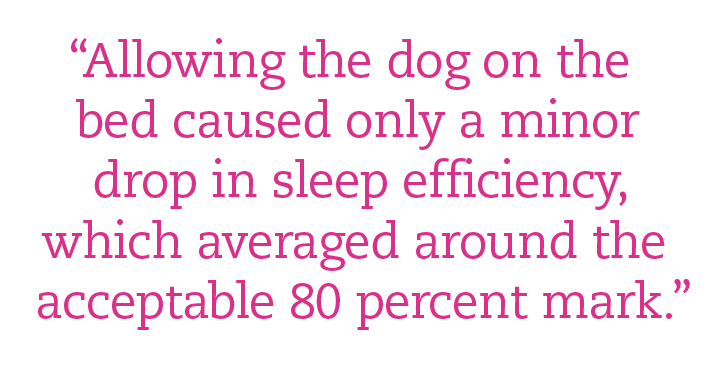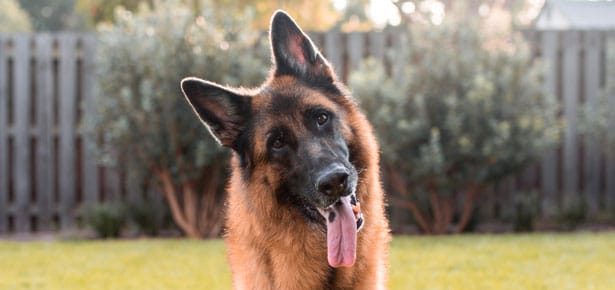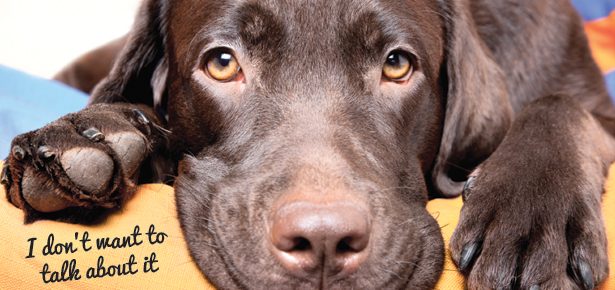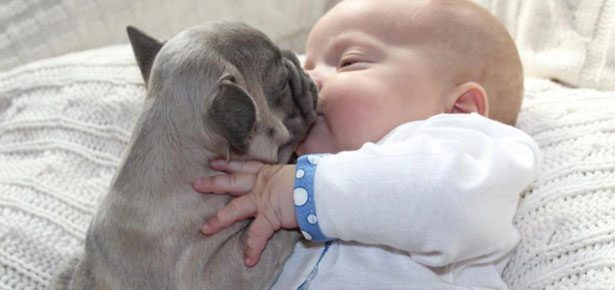

Should You Let Your Dog Sleep in Bed with You?
A new study looks at the effects of canine co-sleeping
I recently received an email question from one of the psychology graduate students in my university. It read, in part:
“I have always shared my bed with my English Cocker Spaniel, Elsapeth. I feel comfortable with her and I think that it improves the quality of my sleep. For that reason, I was surprised (and upset) when my fiancé, who is doing his medical internship at VGH [Vancouver General Hospital], told me that the accepted opinion in the medical community is that a dog should not be allowed to sleep on the bed with a person, and probably should not even be allowed to sleep in the same room. Can you point me to some actual research on this issue?”
The timing of her question turns out to be serendipitous, since a new study has just appeared in the Mayo Clinic Proceedings which deals with this question.
Several surveys have shown that roughly 60 percent of all dog owners allow their dogs to sleep on their bed with them. There are many reasons dog owners give for sharing their beds with their canine companions. One of the most common is that dogs are warm and it feels good to snuggle up to a dog on a cold night. This is consistent with the fact that dogs have a body temperature which is 3 to 6 degrees higher than our own and this makes them a very efficient non-electric blanket or bed warmer. In fact, the term “three dog night” comes from the Canadian Maritime provinces where it was standard practice to take your dog to bed with you on a cold night to help keep you warm. If the night was really cold you might need three dogs to effectively combat the chill.
A second common reason cited for having your pet in bed is that dogs help us relax. A dog's rhythmic breathing when he is lying next to you can help to lull you to sleep. In addition, being near a dog increases the flow of oxytocin, a hormone associated with affection and happiness, as well as relaxation.
A third reason for sleeping with a dog is that that they make us feel safe. We all feel somewhat vulnerable when we are lying in the dark in our beds; the presence of a dog, regardless of size, gives us a sense of being protected.
There are two main medical arguments used to suggest your dog should not be sleeping with you. The Allergy and Asthma Foundation of America recommends that people with allergies keep their pets out of the bedroom because allergens associated with pet dander can build up and cause allergy related problems.
However, the major reason why medical practitioners don't want you sleeping with your dog is the suggestion that dogs may disturb your sleep. This is based on a survey in which 53 percent of pet owners reported that their dogs tend to wake them at least once each night. Since sleep deprivation, no matter what its cause, can have negative physical and mental effects, the conservative recommendation from the medical community has been to simply eliminate this source of sleep disturbance by eliminating the dog from the person's bed.
One problem with the existing data is that the real effect of the sleep disturbance caused by dogs was not directly measured. So, since it was not known whether canine-related sleep disturbance has a major or minor effect on the total amount of night's sleep, a research team from the Mayo Clinic, headed by Salma Patel, decided to objectively measure it.
The technique which this team used involved strapping actimeters (which are movement detectors) to both humans and dogs, and then monitoring their sleep over a seven-day period. Sleep efficiency is measured by comparing the amount of time that you spend actually sleeping with the total amount of time that you are in bed. Sleep efficiency of 80 percent or more is considered to be sufficient. Sleeping with the dog in the bedroom (but not on the bed) maintained an 83 percent sleep efficiency, which is considered to meet usual satisfactory standards. Allowing the dog on the bed caused only a minor drop in sleep efficiency, which averaged around the acceptable 80 percent mark. So the previous research was correct—people with dogs in their bed did, in fact, wake up (somewhat) more frequently throughout the night compared to those whose dog slept elsewhere; however, in terms of the total amount of sleep obtained each night, the effects were negligible.
It is interesting to note that having a human companion next to you in bed did not cause similar sleep disturbances. People who slept two-in-a-bed actually had better sleep efficiency than those who slept alone. This finding may have implications for people who find that their human bed partner objects to the idea of sharing their sleeping accommodations with a dog. When it comes to couples, it turns out that 13 percent admit to having disagreements on whether the dog should be in bed with them or not.
The fact that a human partner and a canine partner might not get along well in bed is something which could have been confirmed by none other than Napoleon Bonaparte. When he married Josephine he learned that her Pug, Fortune, always slept with her. On their wedding night Napoleon was surprised to find that Josephine insisted that the dog remain on the bed as usual. Later that evening, when the newlyweds were flagrante delicto, Fortune took offense at what was going on between his mistress and the general and demonstrated this by biting the French leader on his thigh. Napoleon was not amused and bore a scar and a grudge against the little Pug for the rest of his life. Despite the sleep efficiency study finding, I am sure that he did not get a decent sleep that night!
Join the newsletter and never miss out on dog content again!
"*" indicates required fields
By clicking the arrow, you agree to our web Terms of Use and Privacy & Cookie Policy. Easy unsubscribe links are provided in every email.






